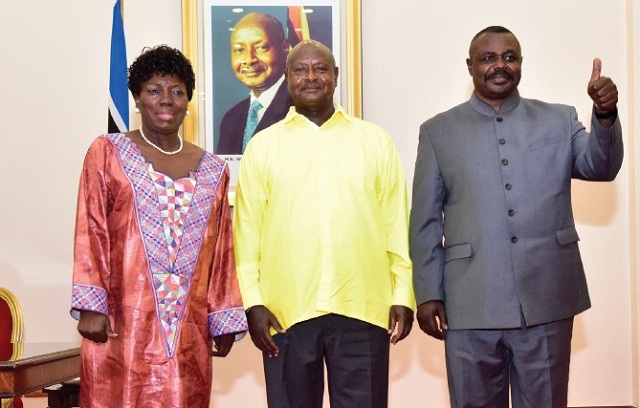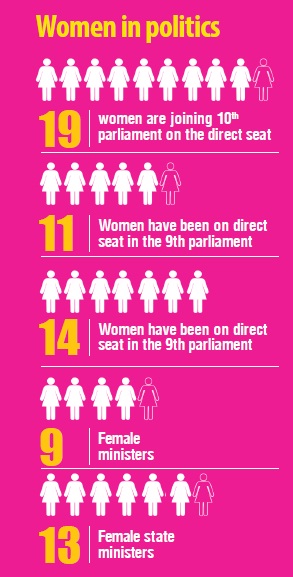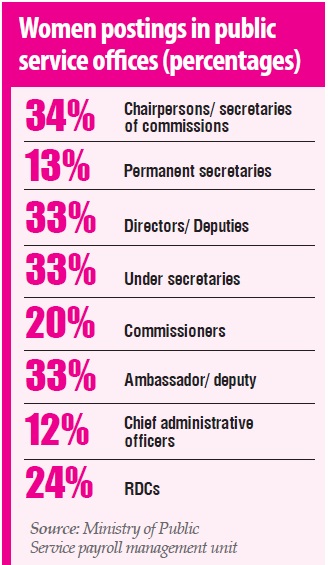Victory casts spotlight on effectiveness of 20-year long gender affirmative action agenda
On May 02, Kamuli district woman legislator, Rebecca Alitwala Kadaga won endorsement from her party to contest for Speakership of the incoming 10th parliament. Kadaga, who has been speaker of the out-going parliament, fought a bruising battle with her deputy, Jacob Oulanyah. Kadaga’s campaigning on the `women’s ticket’ has since put the gender affirmative action agenda under scrutiny.
Miria Matembe, a woman activist and former Member of Parliament, says while she supports Kadaga for speaker again, her strategy of saying she should be favoured because she’s a woman only shows that not enough progress has been made as regards the much promoted women emancipation drive.
“Kadaga has been in high positions including being a minister, deputy speaker and speaker. She can’t be campaigning like that,” Matembe told The Independent, “In any case she shouldn’t have stood on the affirmative action. She’s already strong enough.”

Matembe explained that the intention of creating the district woman MP slot in 1995 was to enable women enter politics; learn how to juggle and then go ahead to take on men in the direct seat slot. Meanwhile other new women would come on the affirmative action ticket. This would create space for more women to join parliament.
But, more than 20 years after the affirmative action slot was instituted, only 19 women will be joining the 10th parliament through the direct slot. The rest are on the affirmative action slot. As a result, only 39% of the over 400 MPs are women. This is a very small number compared to other countries in the East African Region like Rwanda where 64% of the parliamentarians are women.
Prof. Edward Kirumira, the Principal School of Humanities and Social Sciences at Makerere University says the affirmative action loses meaning when it is always the same women occupying the same seat. He says the intention was for it to offer a rotational a chance to more women to participate.
“Quotas may not be a bad idea but the question is whether people take advantage of them. These days they choose those who will more easily accept the hegemony of their leaders who are mostly men,” he says.
Kirumira’s comments tie-in with two policies that earned Uganda an award from the African Union (AU) in 2015; the affirmative action District Woman seat and the one third women representation on local councils. Uganda was praised as one of the countries on the continent leading others in women political empowerment.
Before that, Uganda became the first country on the African continent to have a female vice president in Dr. Speciosa Wandera Kazibwe. It is also one of the few African countries that have had women in key ministries such as Maria Kiwanuka and Syda Bbumba who have been finance ministers, Irene Muloni heading the Ministry of Energy and Mineral Development, and Amelia Kyambadde as Minister for Trade and Industry.
Despite those achievements, Dr. Consolata Kabonesa, a lecturer of Gender Studies at Makerere University argues that affirmative action has not yet yielded much.
“If the affirmative action was erased now, woman wouldn’t make even 5% in parliament,” she told The Independent, “Even in parties, women join women wings focusing mainly on women issues than the mainstream positions.”

Would Kadaga survive?
Kadaga has been a member of parliament for most of her life, having joined the house in 1989. She was 33-years old then and will make 60 years on May 24; just five days after swearing in – again- as Kamuli District Woman MP. Over this time, Kadaga has risen through the ranks; from several ministerial positions to being a deputy speaker and eventually the speaker – the first woman in this position in the country.
Operating in a male dominated 9th parliament where woman were a paltry 35%, Kadaga came out as a tough leader who would not be intimidated or compromised. This came out strongly in 2013 when she went against the position of the NRM, where she was a second National Vice Chairperson, to allow MPs who had been expelled from the party to stay in parliament. Also, she presided over the passing of some controversial bills like the Anti-Homosexuality Bill which earned her the moniker of ‘human rights abuser’ by sections of local and international rights activists.
For most of the time, she came off as a defender of what the majority Ugandans wanted. As a result, some people started speculating that she was `presidential material’. An opinion poll released by Research World International (RWI) in 2012, just a year after the 9th parliament commenced, showed most respondents favoring Kadaga for president if the election was held then. At the time, Kadaga was in the news for her handling of the controversial oil bills debate. In another RWI poll released in 2014, 13% of respondents surveyed said they would vote Kadaga if she stood for presidency in 2016. Gen. Mugisha Muntu who is president of the biggest opposition party, FDC, was favored by 8% and eventual independent presidential candidate, Amama Mbabazi, got 6%.
Because of such a background, when Kadaga’s deputy, Jacob Oulanyah, first hinted on taking her on in the speakership race in the 10th parliament, pundits said Kadaga would whip the Omoro County legislator hands down.
But Kadaga then showed a side of her that viewers were not used to. She became clearly uncomfortable with the challenge and resorted to appearing on different media platforms justifying why she deserves another term. One of the reasons she gave was that there was a plot to deny her the due 10-years “because I am a woman”.
Kadaga argued that women have been sidelined as all the top posts in government are occupied by men. Kadaga’s riding on the affirmative action for women ticket led to questions about why a trailblazer like her would retreat to the gender agenda when picking political cards. But it worked for her. Women activists and members of the Uganda Women Parliamentarians Association (UWOPA) pledged their support. Her challenger in the Kamuli Woman MP race, Deborah Mwesigwa, withdrew her voter bribing petition from the High Court in Jinja because, she said, she did not want to disrupt Kadaga’s speakership contest as a fellow woman.
But for critics, campaigning on being a woman for a person of Kadaga’s caliber is a sign that women are not yet confident enough to take on their male counterparts in the fight for high leadership positions.

Blame it on patriarchy
Dr. Consolata Kabonesa argues, however, that women have not yet earned the respect they deserve and do not have the financial muscle the men have yet politics has been highly monetized.
And Rita Aciro, the Executive Director Uganda Women’s Network (UWONET) says that women should not be blamed for campaigning on ‘being women’.
“Patriarchy has taught them this. It’s widely believed that men are superior to women. It takes generations to dismantle this,” Aciro says. According to her, when women cry out that they are being treated in a certain way, they are actually responding to defeat patriarchy.
“This doesn’t imply that they actually need favours or they are incompetent,” she said.
Aciro says patriarchy – a system of society or government in which men hold the power and women are largely excluded from it – does not onlyapply to parliament but at all levels including the judiciary, academia, and even cabinet where there are only nine female ministers,13 female state ministers, and six permanent secretaries in ministries.
So how come women have emerged without the benefit of affirmative action to successfully heads of state bodies and authorities? Many of these women are seen to perform well to the extent of outshining men and even fix what men have messed.
Kampala City Council Authority (KCCA)Executive Director, Jennifer Musisi, has been praised for changing the face of Kampala in just five years. KCCA under Musisi has cleaned up the city and grown revenue collection from Shs28 billion in financial year 2010/2011 to Shs75 billion in 2014/2015.
At the Uganda Revenue Authority, Doris Akol, is the Commissioner General. She succeeded another woman, Allen Kagina, who did great work at URA. Kagina is now executive director of the Uganda National Roads Authority (UNRA).
In police, Assistant Inspector General of Police (AIGP) Grace Akullo heads the tough criminal Investigations and Intelligence Directorate (CIID) which handles major criminal cases and Justice Irene Mulyagonja, the Inspector General of Government (IGG) for handling high profile corruption cases.At the National Social Security Fund (NSSF), Geraldine Ssali is the Deputy Managing Director. Although she is involved in a turf fight with the Managing Director, Richard Byarugaba, Ssali has not said she is being targeted because she is a woman. Is gender affirmative action, therefore, only for women in politics like Kadaga?
Not so says Kabonesa. According to her, it is unfair for political leaders to be compared to leaders in other statutory bodies because in these bodies, these women are bosses and major decision makers who are only accountable to one individual or a small group of people.
“Politicians are never in charge. They are in that job because they were voted by people and they are therefore accountable to different groups of people,” says Kabonesa.
She says though Uganda has made a step in empowering woman to involve themselves in democratic processes such as contesting in an election and voting, there is still a long to changing long-held societal behavior and attitudes to women.
“Women are there but it’s only a few that can actually articulate issues. While we need the numbers, we also want to retain those that can articulate issues ,” Kabonesa argues.
Despite such strong support for affirmative action, Matembe said women MPs should be limited on the number of times they can stand on the affirmative action slot. She says this will enable the big shots such as Kadaga and others like FDC’s strong woman Cecilia Ogwal of Dokolo district to move on and, possibly, unseat men.
 The Independent Uganda: You get the Truth we Pay the Price
The Independent Uganda: You get the Truth we Pay the Price


